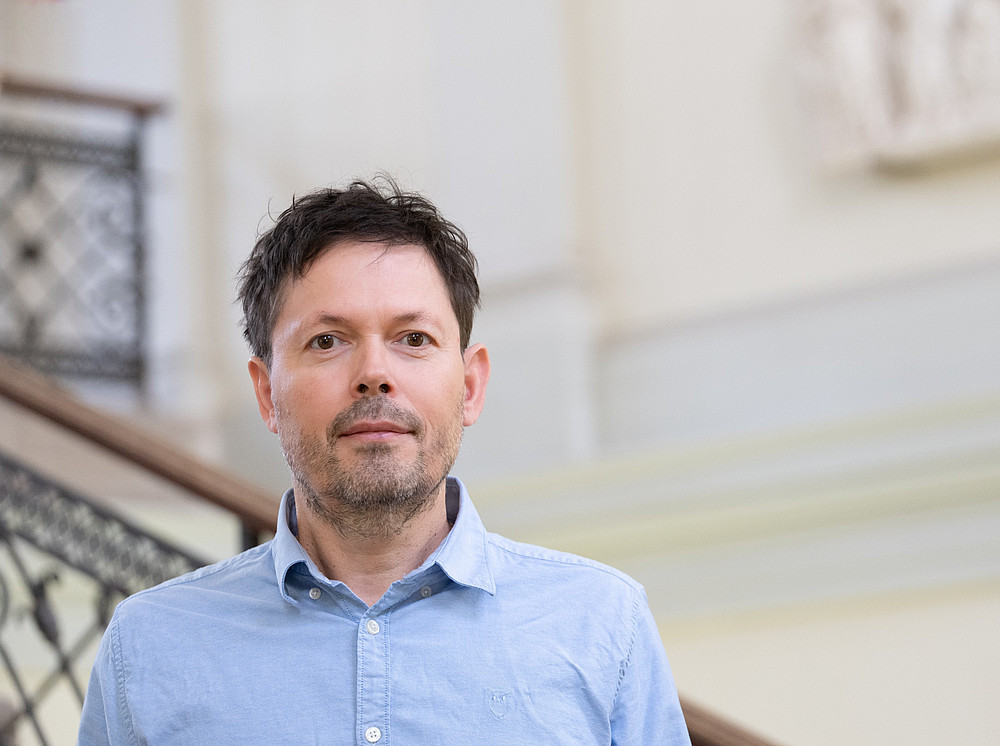Art and science
What are cabinets of curiosities? How do you print nature? And why were 17th century Dutch people so fascinated by Mediterranean harbours? The art historian and specialist in early modern art, Robert Felfe, deals with these questions. He has been Professor of 15th to 17th century art history at the Institute of Art and Musicology at the University of Graz since 2020.

Printed nature
Who hasn't seen them yet? Prints of leaves or other plants, directly on paper? This technique of printing nature itself was used from the 15th century at the latest: On the one hand, it served as a natural history image material in botany, on the other hand, it was also valued as a work of art due to its aesthetic quality. Robert Felfe's current research is dedicated to the history and significance of this technique, particularly in the period from the 16th to the 19th century. One focus of his work is on the hitherto little-researched estate of the 19th-century botanist Constantin von Ettingshausen from Graz, who worked intensively with this method. The results of this research are expected to be published as a monograph in 2027.
Nature self-prints are experiencing a rediscovery today, both in art and in the popular sphere. Artists such as Anna Artacker are using this technique to address ecological issues and a new awareness of nature. This is in the context of a "vegetal turn" (a turn towards the plant world) in art and cultural studies.
A forerunner of the museum
Another subject area that Robert Felfe focussed on was cabinets of curiosities, also known as art and natural history cabinets. These are collections that were created from the late 16th century onwards. They brought together works of art, ancient artefacts, natural history objects (such as anatomical specimens, fossils and plants) and scientific materials in a common museum context. They are considered the forerunners of modern museums, but were mostly private collections in royal houses, scholarly households or monasteries and not open to the public.
The fascination of the cabinets of curiosities lies - not only for Robert Felfe - in their diversity and their interdisciplinary character. They united art, science and nature in one room and offered a unique opportunity to explore and admire the world in its entirety. The collections were not only aesthetically impressive, but also places where artists, such as Rembrandt, who owned one himself, and scientists actively worked with the objects.
Today, the idea of cabinets of curiosities is being revived, as they can create a new awareness of the close connection between art, science and technology. They offer inspiration for interactive and interdisciplinary approaches in museum work.
The dream of the Mediterranean
In his latest project, Robert Felfe is investigating the depiction of Mediterranean landscapes, in particular coastlines and harbour scenes, in 17th century Dutch painting. The central question is why the Mediterranean played such a prominent role in 17th-century Dutch art, even though the Netherlands had its greatest global interests and competitions in other regions. The project examines the interactions between regional and global perspectives in the art of this period.
Robert Felfe is not only fascinated by the high level of artistic innovation and production in the Netherlands in the 17th century, but also by the hitherto little-researched role of the Mediterranean in this art. He sees this as a "blind spot" in previous research; a research gap that he wants to close.
An expansion of the understanding of the world
Research- and interest-led teaching is important to Robert Felfe. He attaches great importance to direct engagement with works of art and practice-orientated formats such as excursions, as well as intensive support for individual students who choose this subject, because for Robert Felfe, art history is a key to critical reflection on the past and present and to expanding our understanding of the world.
Robert Felfe studied art history and cultural studies in Greifswald and Berlin, where he gained his doctorate in 2000 and habilitated in 2011 with a thesis on the history of knowledge in 16th and 17th century art. After guest and deputy professorships in Berlin, Mainz and Constance as well as a research professorship in. Hamburg, he moved to the University of Graz in 2020.